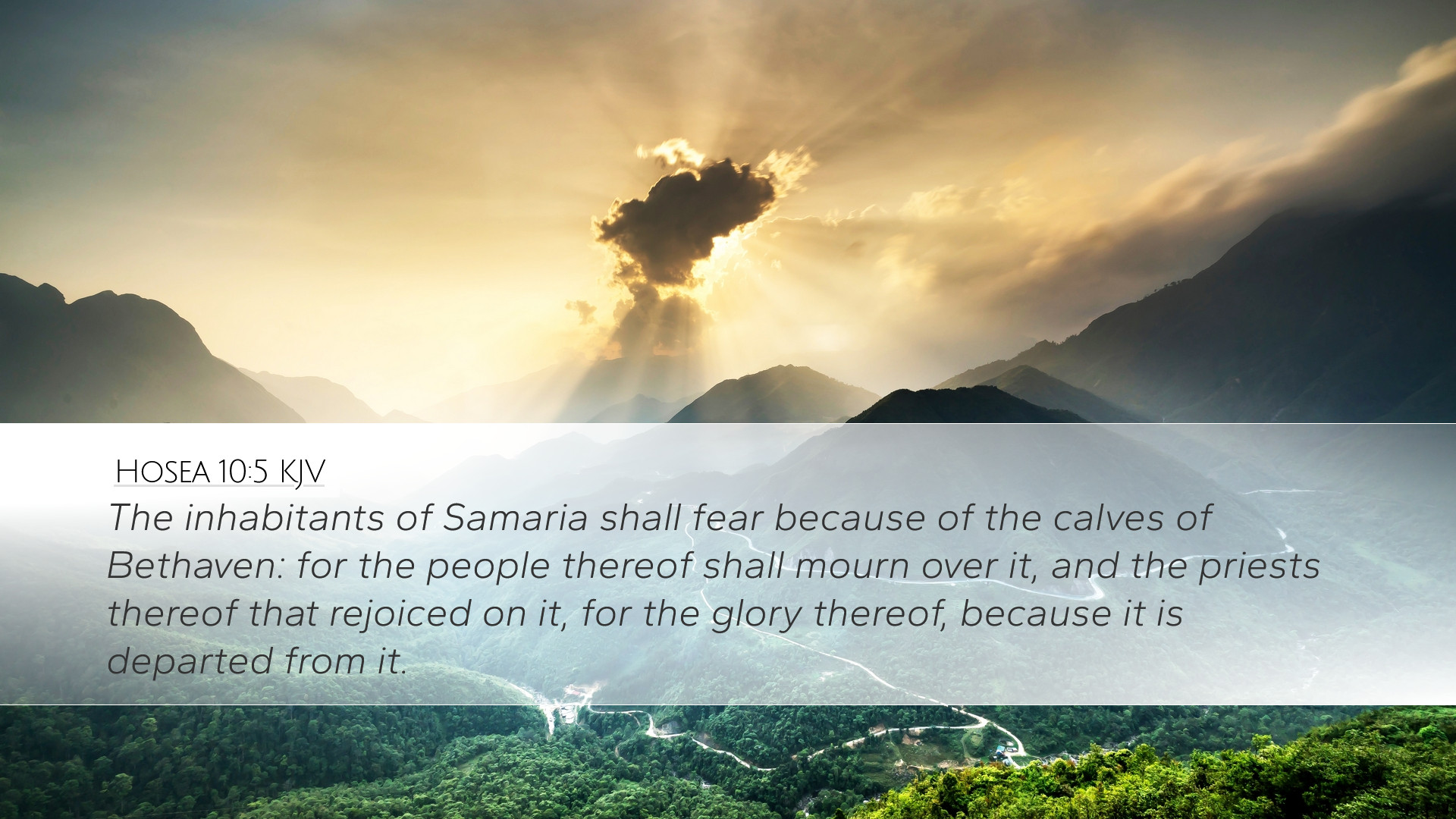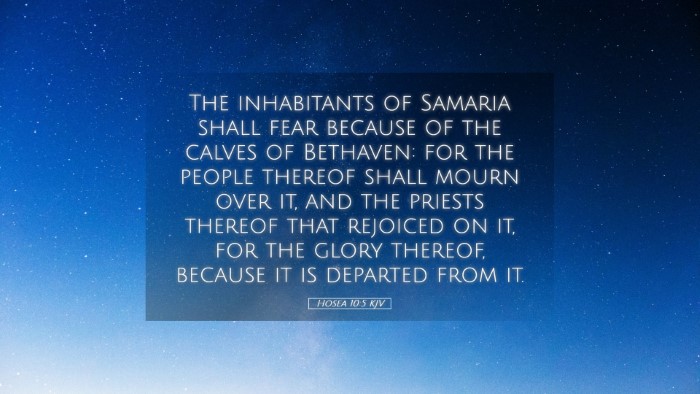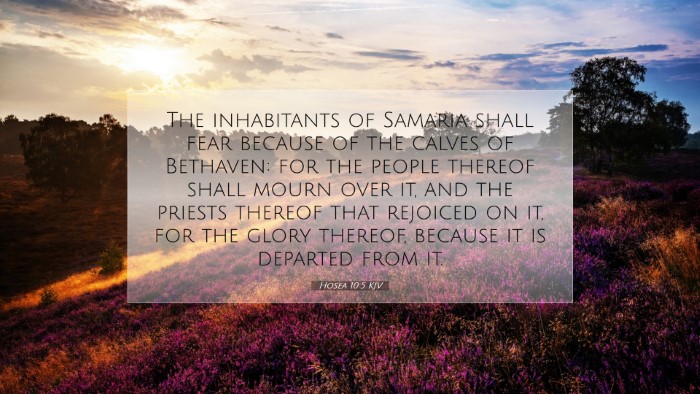Old Testament
Genesis Exodus Leviticus Numbers Deuteronomy Joshua Judges Ruth 1 Samuel 2 Samuel 1 Kings 2 Kings 1 Chronicles 2 Chronicles Ezra Nehemiah Esther Job Psalms Proverbs Ecclesiastes Song of Solomon Isaiah Jeremiah Lamentations Ezekiel Daniel Hosea Joel Amos Obadiah Jonah Micah Nahum Habakkuk Zephaniah Haggai Zechariah MalachiHosea 10:5
Hosea 10:5 KJV
The inhabitants of Samaria shall fear because of the calves of Bethaven: for the people thereof shall mourn over it, and the priests thereof that rejoiced on it, for the glory thereof, because it is departed from it.
Hosea 10:5 Bible Commentary
Commentary on Hosea 10:5
Hosea 10:5 states, "The inhabitants of Samaria shall fear because of the calves of Beth-aven: for the people thereof shall mourn over it, and the priests thereof that rejoiced on it, for the glory thereof, because it is departed from it." This verse speaks to the idolatrous practices of Israel, particularly focusing on the fear and mourning associated with the worship of the golden calves.
Historical Context
The Book of Hosea addresses the Northern Kingdom of Israel during a time of moral decay, religious apostasy, and impending judgment. The idolatry referenced here points specifically to the calves that were established in Dan and Bethel by King Jeroboam I, as recorded in 1 Kings 12:28-30. These were meant to be alternatives to worship in the temple in Jerusalem.
Commentary Insights
Matthew Henry's Commentary
Henry notes that the “inhabitants of Samaria” symbolize the people who have turned away from true worship, exhibiting a fatal reliance on false gods. Their fear is characterized as a consequence of impending disaster; they will experience a loss that directly correlates with their idolatrous practices.
Furthermore, the “calves of Beth-aven” represent not only false worship but also the empty promises of idols, which cannot deliver in times of crisis. This idolatry leads to despair, revealing the futility of placing trust in anything other than the one true God.
Albert Barnes' Notes on the Bible
Barnes emphasizes that “fear” comes from the realization that the idols, which were once sources of pride and glory for the people, can no longer provide security or deliverance. Their “mourning” signifies a recognition of loss when the worship centered around these idols proves ineffective, especially during times of national threat.
He elaborates on the phrase “the glory thereof is departed,” indicating that the perceived power and favor once associated with these calves have vanished. When the security they believed they had is stripped away, it leads to an acute awareness of their spiritual bankruptcy.
Adam Clarke's Commentary
Clarke highlights that the term “Beth-aven” means “house of vanity,” emphasizing the futility of idol worship. He draws a contrast between what the calves represent — a substitute for God's presence — and the deep emotional turmoil that manifests when their false security is exposed.
The reaction of the “priests” underscores the sobering reality that even religious leaders are caught in the cycle of sin and grief. Clarke's analysis brings focus to the collective mourning, which encompasses the entire community, showcasing the devastating consequences of idolatry on a societal level.
Theological Themes
This verse serves to illuminate several key theological themes relevant for pastors, students, and scholars:
- The Nature of Idolatry: The fear exhibited by the people underscores the emptiness of false gods and the need for true allegiance to the Lord.
- Corporate Sin and Its Consequences: The corporate mourning of the people signifies that sin affects not just individuals but communities. The actions of leaders and the populace are interconnected.
- The Pursuit of True Worship: The text calls believers to examine their worship practices and their sources of trust. It challenges the contemporary church to heed the call to return to authentic worship of God.
Practical Applications
For modern-day audiences, Hosea 10:5 resonates with the challenge of evaluating what we place our trust in and encourages introspection regarding our spiritual practices.
- Self-Examination: Believers should regularly audit their lives for “calves” that may have taken the place of God.
- Community Awareness: The communal aspect of idolatry reminds leaders of their influence in guiding congregations toward true worship and away from vain substitutes.
- Hope Amidst Judgment: While the verse addresses dire consequences of sin, it ultimately leads to the hopeful expectation of restoration — a theme prevalent throughout Hosea.
Conclusion
Hosea 10:5 stands as a poignant reminder of the nature of idolatry and its far-reaching impacts. The commentary from notable scholars affirms the need for vigilant worship practices rooted in truth rather than in false representations of God. As we navigate our spiritual journeys, may we heed the warnings of the past and strive toward authentic communion with the Lord.


